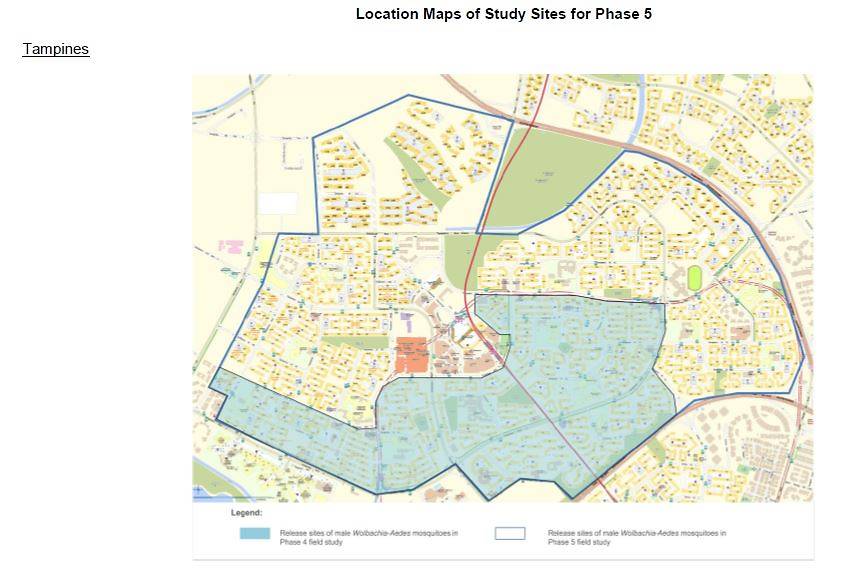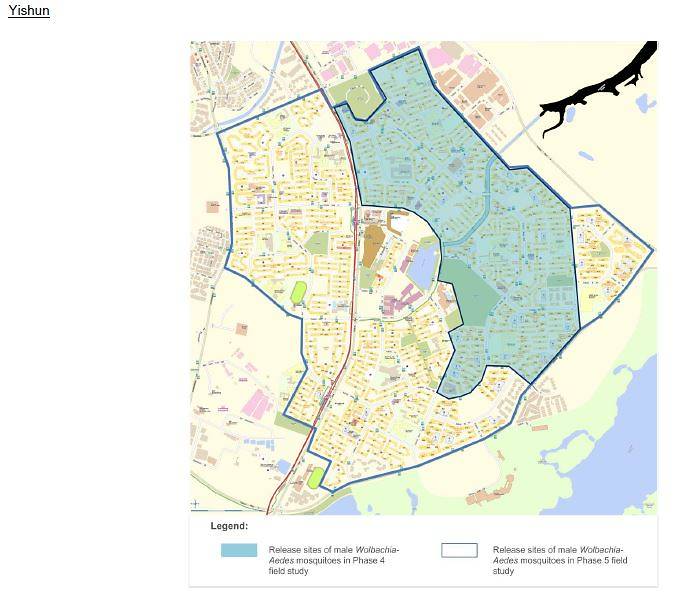SINGAPORE: A project to combat dengue by releasing specially bred mosquitoes will be widened to cover all Yishun and Tampines HDB towns from July, encompassing about 15 per cent of HDB blocks in Singapore, the National Environment Agency (NEA) said in a news release on Friday (Jul 17).
This phase will progressively cover a total of 1,455 HDB blocks across both towns by March 2022 and is part of Project Wolbachia – Singapore.
Since 2016, NEA has been conducting phased field studies to evaluate the use of male Wolbachia-Aedes mosquitoes to suppress the urban Aedes aegypti mosquito – the primary vector of dengue, chikungunya and Zika viruses in Singapore.
READ: Number of dengue cases in 2020 so far surpasses 2019’s total count
When the released male Wolbachia-Aedes mosquitoes mate with urban female Aedes aegypti mosquitoes, the resulting eggs do not hatch.
“Over time, continued releases of male Wolbachia-Aedes mosquitoes are expected to bring about a gradual reduction in the urban Aedes aegypti mosquito population, hence lowering the risk of dengue transmission at the release sites,” NEA explained.
Over in Yishun and Tampines, Phase 4 of the field study that started in November 2019 covered 293 and 260 blocks and saw significant changes to the mosquito population, said NEA, which described the results as “promising”.
“At release areas where urban Aedes aegypti mosquito populations were high (up to 20 to 30 mosquitoes caught per 100 Gravitraps per week), the mosquito population had dropped significantly by May 2020, to as low as two mosquitoes caught per 100 Gravitraps per week in some areas.
“The risk of dengue transmission is correspondingly lower at this low Aedes aegypti mosquito population level.”
NEA’s preliminary analysis also showed that in 2019, there were 65 to 80 per cent fewer dengue cases at the Yishun and Tampines study sites, when compared to areas without releases.
File photo of an Aedes aegypti mosquito, as seen through a microscope. (Photo: AFP/Mauro Pimentel)
“With the releases, residents may notice more non-biting mosquitoes around their homes,” said Associate Professor Ng Lee Ching, director of NEA’s Environmental Health Institute.
“While this is something we are not used to experiencing in Singapore, the data shows a clear benefit to residents at the release sites. Significantly fewer female dengue mosquitoes mean fewer Aedes mosquito bites and less dengue.”
READ: Weekly number of dengue cases in Singapore surpasses ‘historical high’
WILL THIS STRATEGY BE SUCCESSFUL?
With the endorsement of its Dengue Expert Advisory Panel (DEAP), NEA will gradually expand male Wolbachia-Aedes mosquito releases to all 686 and 769 blocks in Yishun and Tampines respectively.
Phase 5 of the field study at Yishun and Tampines will start on Jul 27 and Aug 11, respectively, and is expected to fully cover the two towns by March 2022.
This will cover about 15 per cent of HDB blocks in Singapore, up from the current 5 per cent.

(Image: NEA)

(Image: NEA)
“This is an exciting and very important next step in the Project Wolbachia – Singapore scale-up strategy,” said Professor Duane Gubler, DEAP chairman and emeritus professor at Duke-NUS Medical School, Singapore.
“Based on the extensive preliminary research conducted by NEA, I fully expect this scale-up to be successful.
“If so, the roll-out at Yishun and Tampines will be a seminal demonstration to the world that male Wolbachia-Aedes mosquito releases can be used to help control dengue in highly endemic cities.”
READ: Wolbachia mosquito field test ‘successful’, project expanded to dengue high-risk areas in Choa Chu Kang, Bukit Batok
“NOT A SILVER BULLET”
However, even as the project “continues to show good results in keeping the Aedes aegypti mosquito population low”, NEA cautioned the technology is “not a silver bullet”.
“Wolbachia-Aedes mosquito releases are currently only being conducted in a small number of neighbourhoods,” the agency said.
“It is intended to complement – not replace – traditional vector control measures, such as comprehensive mosquito surveillance, source reduction of mosquito breeding habitats, and use of insecticides where necessary.
“With dengue endemic in Singapore, our population’s low immunity and the impact of climate change, we need to constantly refresh and update our tools and measures to keep dengue under control in Singapore.
“Project Wolbachia – Singapore should be seen in this light.
So far, the number of dengue cases in Singapore this year has surpassed the total number of cases for the whole of 2019, data from the National Environment Agency on Tuesday showed.
A total of 1,678 dengue cases were reported in Singapore last week, making it the fifth consecutive week the weekly numbers have breached the 1,000 mark.




